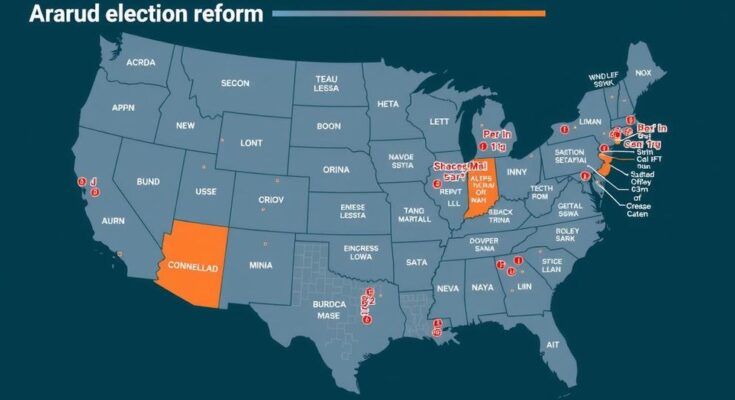Voters across the US overwhelmingly rejected proposed election reforms, such as ranked choice voting and open primaries, despite significant financial backing. This outcome suggests a disconnect between funding efforts and voter readiness for change, with many preferring traditional electoral methods. Advocates are now reconsidering their strategies, emphasizing the need for grassroots support and gradual approaches in future initiatives.
In recent elections across numerous states, voters decisively rejected significant election reforms despite a robust financial campaign exceeding $100 million from advocates seeking to alter voting methods. This included proposals for ranked choice voting and open primaries, aiming to provide voters with a more extensive range of candidate options. The results indicated a lack of readiness for such changes among the electorate, with many preferring traditional voting methods even amidst widespread frustration with the current political environment. Activists involved in this movement expressed concern that their initiatives might have been prematurely launched without the necessary grassroots support.
For instance, states like Arizona, Colorado, and Nevada witnessed the rejection of ballot measures that would have transformed their electoral systems. Even in Alaska, where a previous approval for similar reforms occurred, the majority of voters could not support the repeal of ranked choice and open primaries, which narrowly missed passing. Advocates posited that these results demonstrate the complexities and challenges inherent in reforming electoral procedures and indicated a need for a more nuanced approach in future initiatives. Even though significant funding was mobilized, it was insufficient to sway voter sentiment, highlighting a disconnect between financial resources and effective advocacy.
The outcomes revealed a broader hesitation among the electorate regarding alternative voting methods, as those methods can be perceived as confusing. Research and data suggest that while ranked choice voting can contribute to a more representative outcome, it may also discourage participation due to its complexity. Some officials and researchers are now advocating for a strategic reevaluation of how to promote electoral reform, suggesting that a more gradual, grassroots-oriented strategy may be more effective in the long run. Future efforts may involve separating campaigns for open primaries from those advocating ranked choice voting, as well as emphasizing incremental improvements rather than sweeping changes.
The recent elections showcased a significant setback for advocates of election reform across various states in the United States. With more than $100 million spent on voter initiatives aimed at instituting ranked choice voting and open primaries, the overwhelming rejection of these measures indicates a critical juncture in the movement for electoral reform. After witnessing voter approval in states like Alaska in previous years for similar reforms, advocates were optimistic about expanding these methods but faced a harsh reality during this cycle.
In summary, the recent electoral defeats for proposed reforms underscore the complexity and challenges faced by advocates of electoral change. With voters demonstrating a preference for traditional voting methods despite significant financial backing and previous successes, proponents must reconsider their strategies moving forward. Emphasizing grassroots support and incremental changes may be essential steps for cultivating a more receptive environment for future reform initiatives.
Original Source: apnews.com




